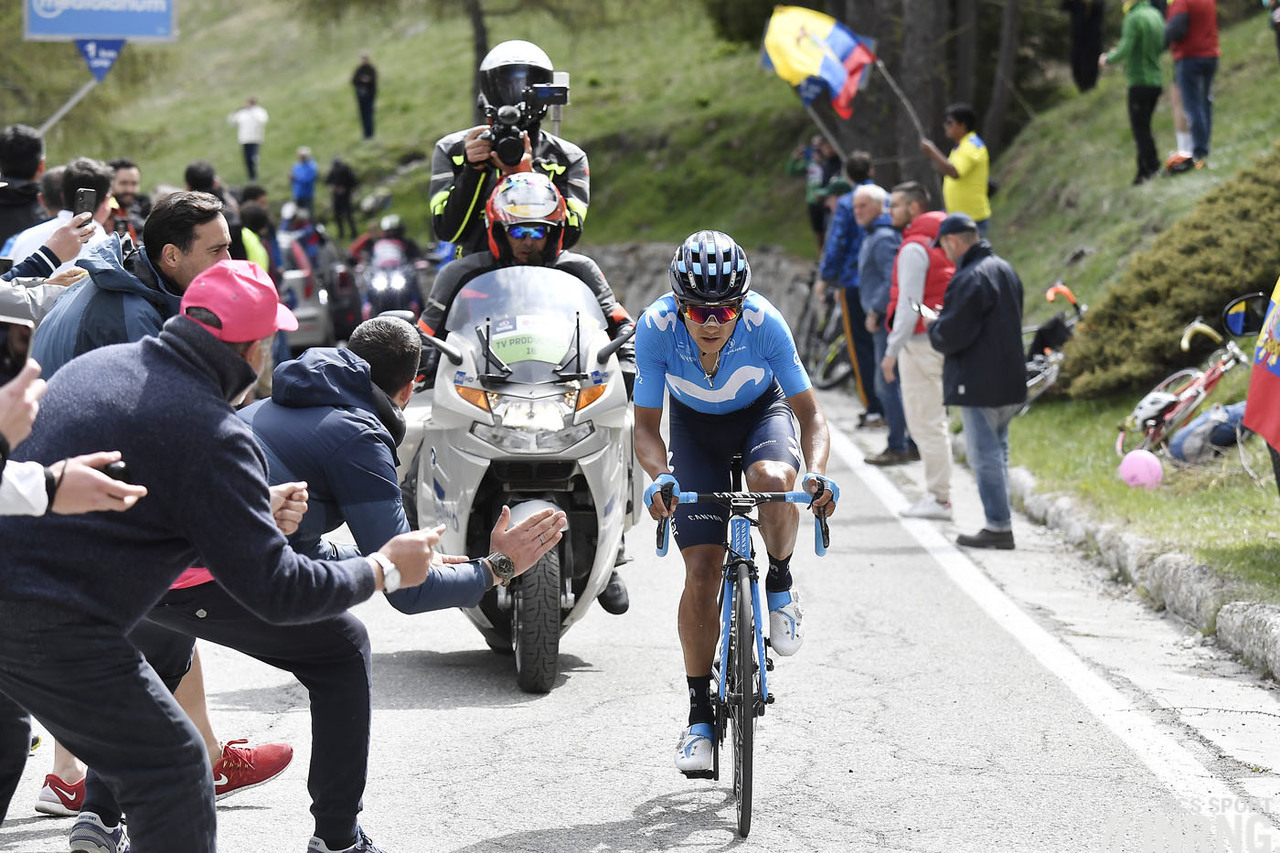
Richard Carapaz is solo on the Colle San Carlo on Stage 14, he’s got a slender lead of 20 seconds but behind a team mate in Mikel Landa is marking Vincenzo Nibali and Primoz Roglič and they’re both marking each other. Carapaz maintained his advantage on the descent and once on the valley road to Courmayeur the “Locomotive of Carchi” pressed on, hunched low on his bike, hands in the drops and taking for every second he could. It put him in the maglia rosa and he never trembled for the remaining week.
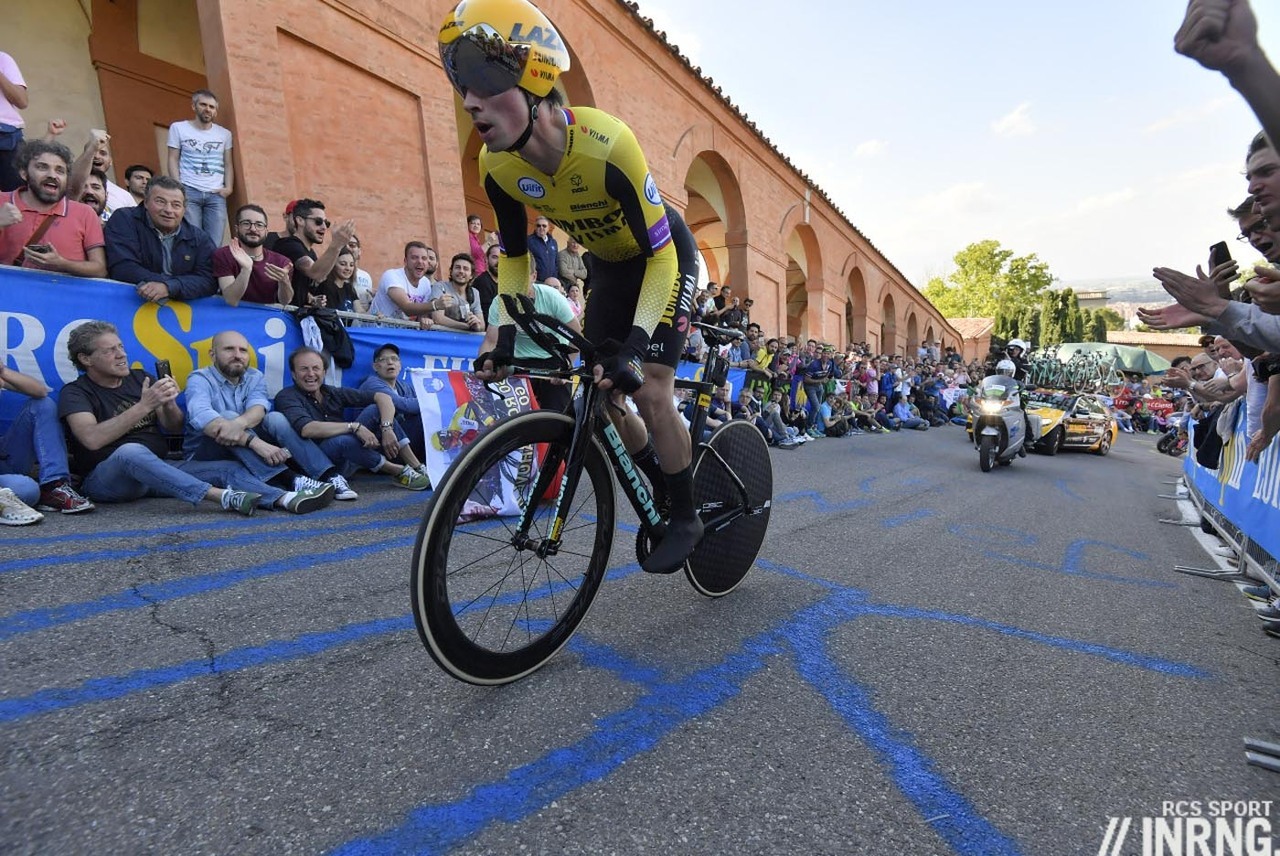
The start in Bologna was perfect and accidental. After the plans for a grande partenza in Matera fell apart at the 11th hour the route of the first week had to be redrawn. If grand tours are reflections of the country this wasn’t ideal but the initial result was satisfying. Bologna stepped in and provided us with the spectacular climb to the San Luca Basilica. The prime riders all started early with the exception of Simon Yates, this seeding is something television producers may want to revise. Primož Roglič came to Bologna as a burning favourite and showed it, torching the field to win by 19 seconds on Simon Yates.
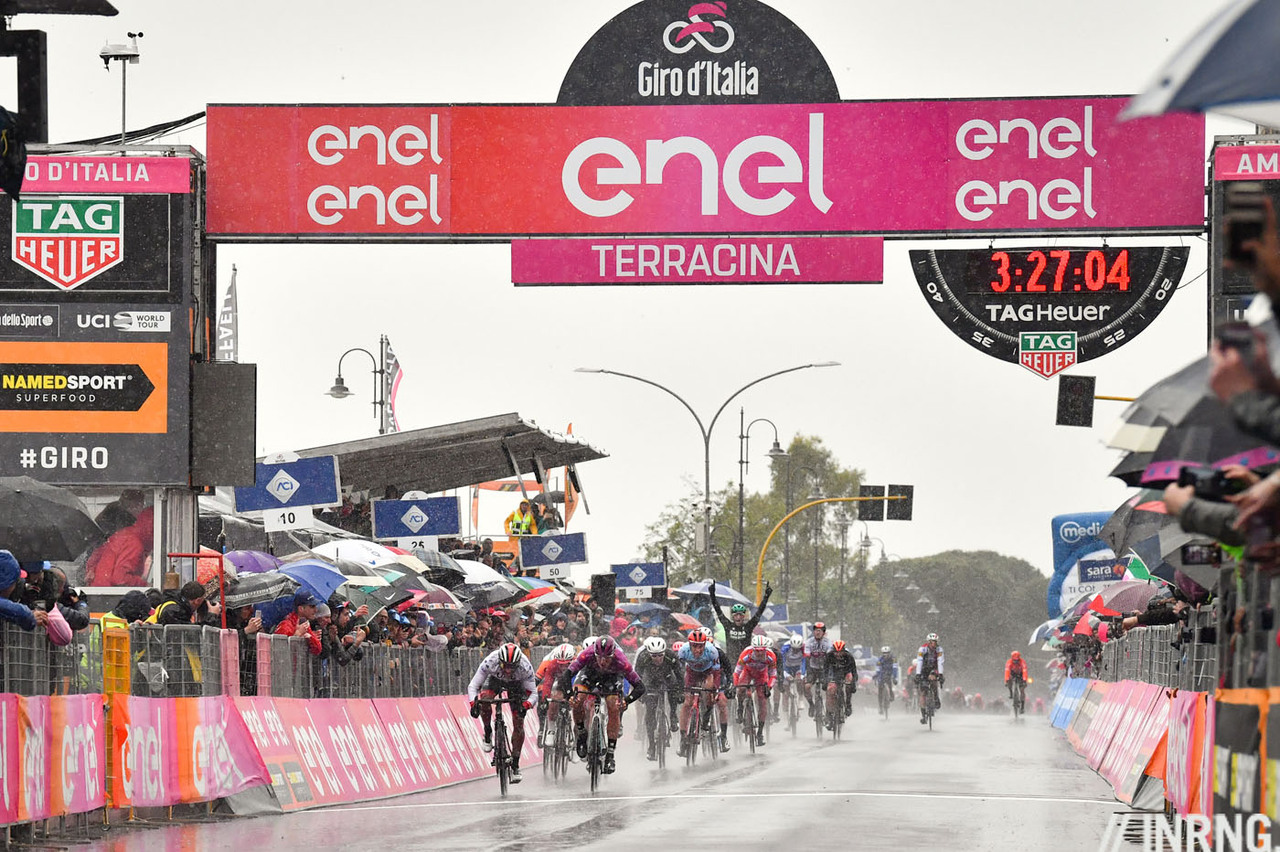
Then came a parade of sprint stages. The beauty of Italy’s geography is that Giro is always within reach of a hilltop town or a mountain pass, if not every day then at least the next day. Only this time the opening week had fewer features than the Tour of Denmark. Perhaps the revised course was to blame and the already marathon stage distances meant the route couldn’t afford to bend inland in search of spice. It left audiences cold and the peloton didn’t fare better with cool temperatures and frequent rain. Another storm blew in, called Operation Aderlass, it saw a rider and team staff suspended during the race but surprisingly didn’t blow up into anything bigger.
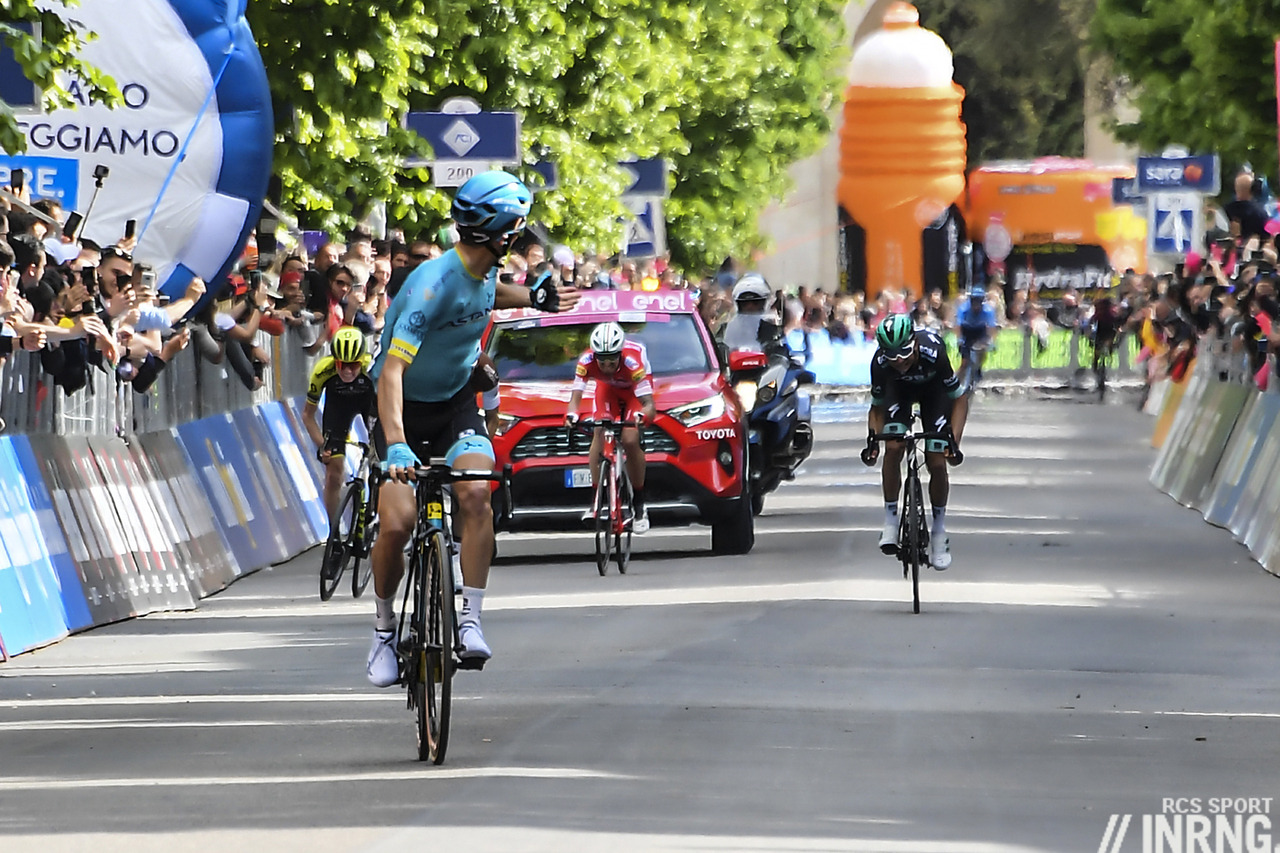
The best stages in the opening two weeks were those that did venture into the hills, with Fausto Masnada’s win in San Giovanni Rotondo and Pello Bilbao’s win in L’Aquila. Sprint stages can be good but need not be every day and the opening 11 days of the race were something you could catch on the radio while doing something else rather than a compelling drama.
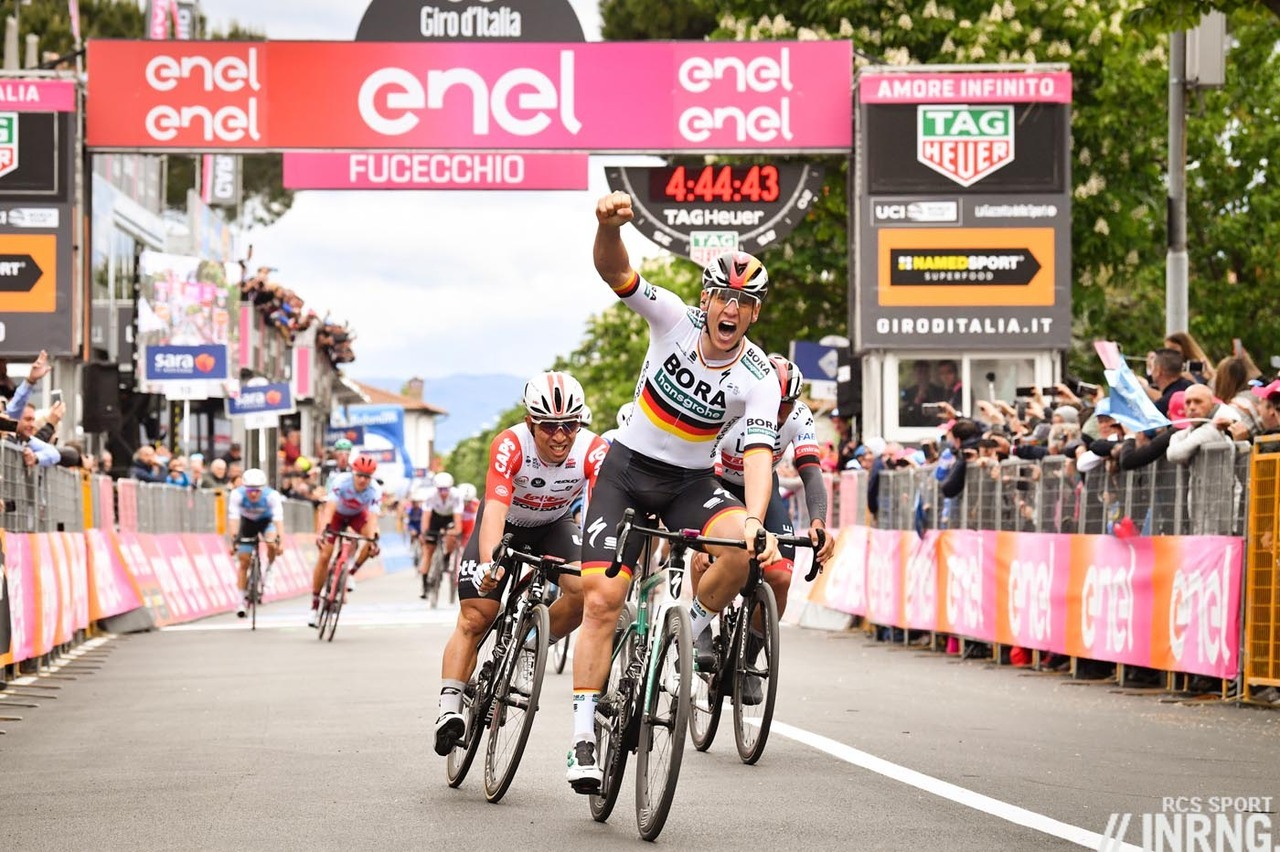
Pascal Ackermann won two stages on his way to winning the points competition, a great grand tour debut that sets up a headache for Bora-Hansgrohe management as they try to juggle his ambitions and those of Peter Sagan. It could prove perfekt if the German team hawk Sagan to the Giro next year for a substantial appearance fee and then deploy Ackermann in France. Arnaud Démare got a stage and if Ackermann wins the maglia ciclamino, Démare lost it too after a bungled sprint. Caleb Ewan took two wins but quit like other several sprinters before the Alps appeared for fear of altitude sickness.

Richard Carapaz’s stage win in Frascati wasn’t really a sign of things to come, more a sign of things past. In a hectic finale where the peloton was split by crashes, Carapaz managed to stay with the front group and delivered a late attack that resembled his punchy stage win atop Montevergine last year. This was also the day the Tom Dumoulin crashed, sustaining injuries that would seem him leave the race the next day. It left Team Sunweb orphaned but Chad Haga rode on to stay as fresh as possible and win the final time trial.
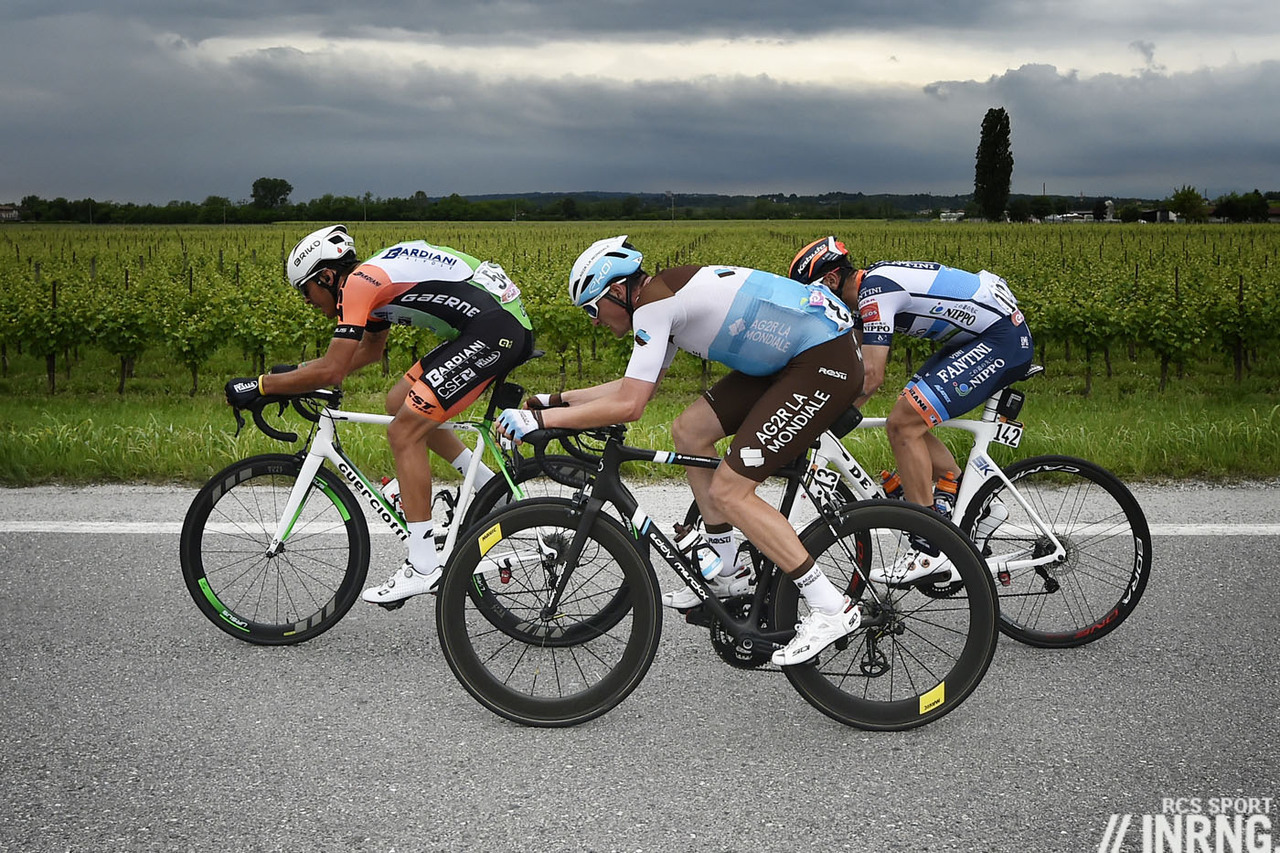
Breakaways had a great time. Excepting the Verona TT, from Stage 12 onwards every stage went to the breakaway which suggests the race was open and no team was able to lock the race down, the Ineos jersey was sometimes hard to spot in the mountains. The wildcard teams were good value, or at least Androni-Sidermec and Nippo-Vini Fantini who got a stage win each via Fausto Masnada and Damiano Cima, and their sponsors invest in cycling for moments like this. Bardiani-CSF tried but weighed less on the race while Israel Cycling Academy were the odd one out, often all in for Davide Cimolai on the flat days rather than the breakaways but typically this resulted in a sixth or seventh place finish.
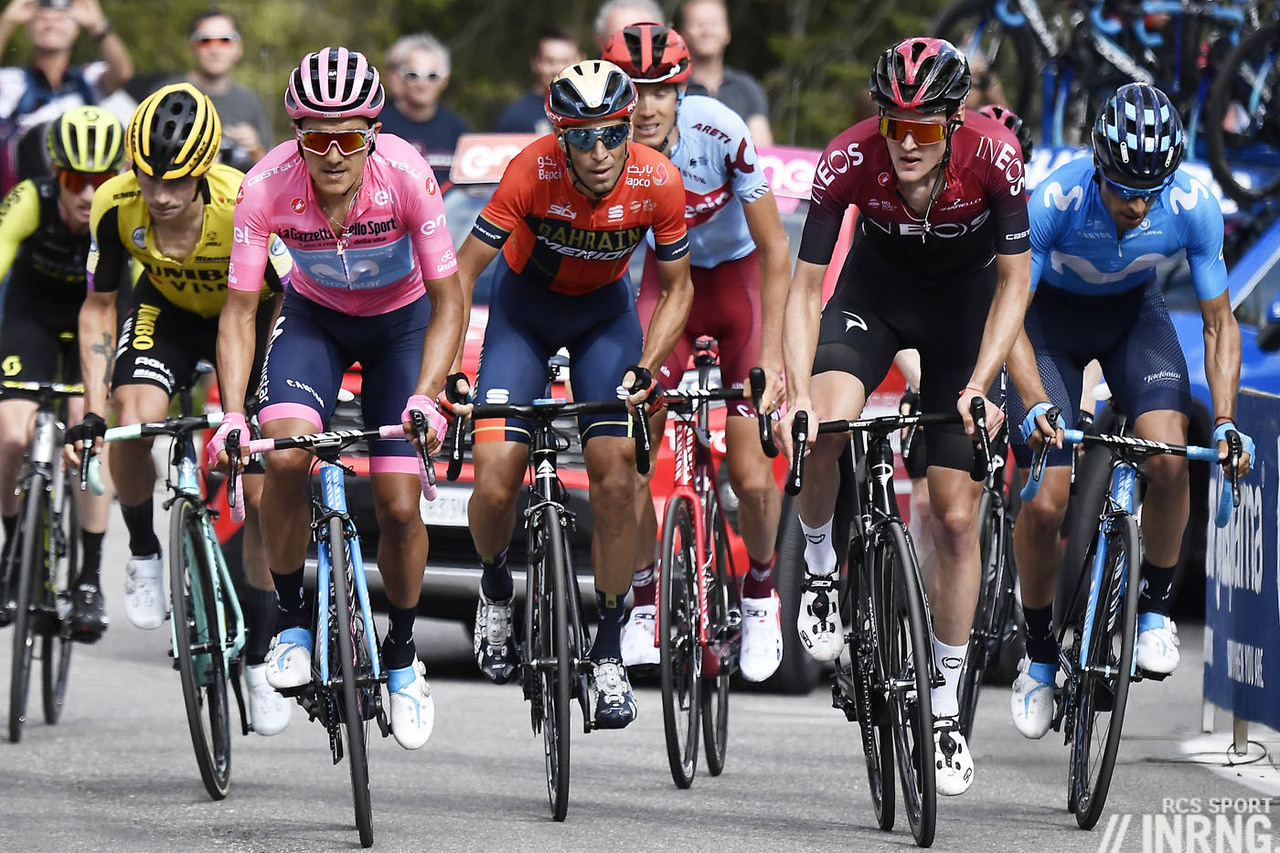
Another satisfaction was seeing promising riders on the up. Away from the pressures of the Tour de France, the Giro is a good test for Under-25 riders. Lopez’s repeat white jersey doesn’t add much, his fast-track career trajectory has slowed a touch but he’s still a work-in-progress. Pavel Sivakov’s confirmed the talents shown during his final amateur year when he won the Ronde de l’Isard, the U23 Giro, the Giro delle Valle d’Aosta and the final stage of the Tour de l’Avenir, a sweep and much like Tao Geoghegan Hart – who didn’t get to show us what he could do – he seems a polished product already, at ease in front of the cameras and he’s still 21 meaning he can come back again and again to win the white jersey; but will he if Ineos come back with other leaders and bigger ambitions. Hugh Carthy is still only 24 and had a great Giro, resembling he days when as a Caja Rural rider he’d climb with the best only this time he was doing it deep into the third week of the Giro. Valentin Madouas rode the spring classics and came to the Giro just to bank a grand tour but came close on stages and showed climbing ability beyond what many predicted. Giulio Ciccone took the mountains jersey and a stage and was all over the race with more than double the mountain points of his nearest rival, he’d won a stage in 2016 aged 21 but has since had heart surgery. Eddie Dunbar only got the call to ride during the Tour of Yorkshire after Egan Bernal crashed out but showed versatile talent too.
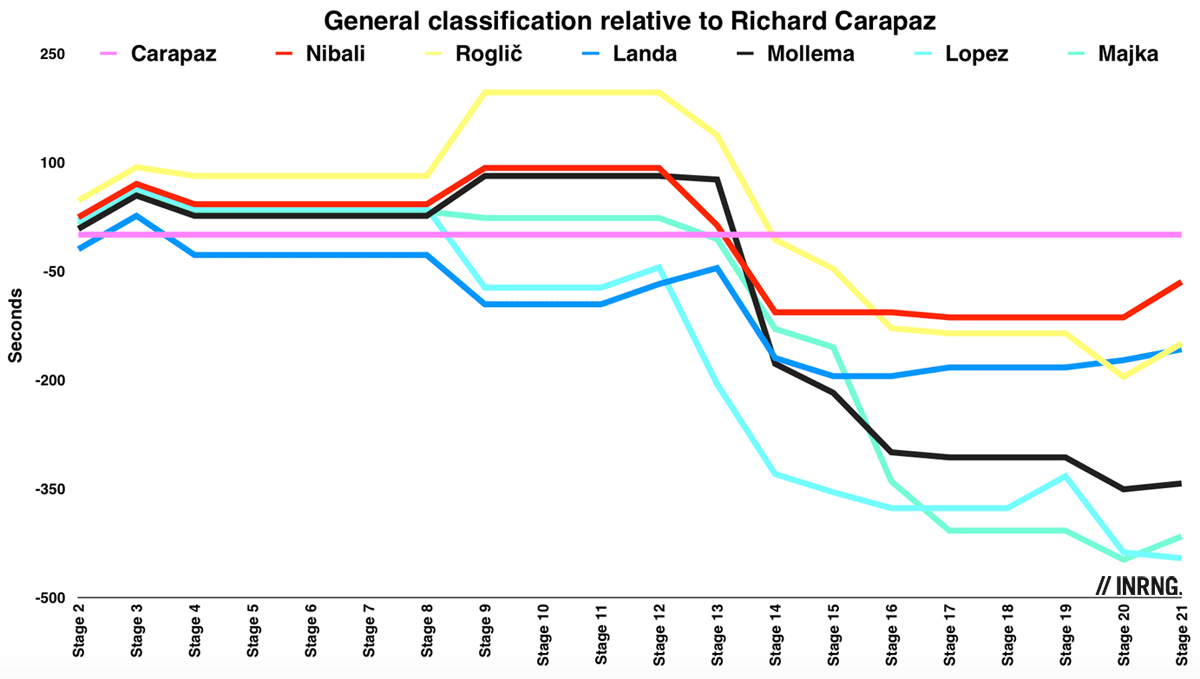
Carapaz is a deserving winner. As the chart above shows, he was behind the superstar names in the opening stages but never out of the picture, his early stage win helped reverse time losses in the opening TT. But it was the Alps that made the difference. He went into the two opening mountain stages over three minutes down on Roglič and came out in the maglia rosa. First riding away on the Colle del Nivolet and then again on the Colle San Carlo, you can see the downward plunge of his rivals on the chart as they lose time to him. Once in the lead Carapaz was a fortress that resisted all attacks and saw others fade. As you can see on the chart the lines are almost parallel for the final week rather than a spaghetti bowl of plot twists. First Roglič lost time, the bungled bike change on the stage to Como and the crash soon after cost the Slovenian time, an embarrassing moment for the team and we’ll never know if his crash injuries also contributed to him losing ground on the Mortirolo or if this was his form fading. Probably both. Nibali was strong but as the red line shows in the chart, he never so much as dented Carapaz’s lead, even the stage to Como with the Civiglio climb and its descent, practically home to Nibali, saw Carapaz match Nibali. Combined Nibali and Roglič did mark each other but this might have been as much physiological as tactical in that their climbing speeds were similar in the two opening stages, neither could shake the other. It all meant that come the final mountain stage and the thing Carapaz feared most was an “incident”, a crash or a puncture more than fatigue or failure. His Movistar team were cohesive and effective and once again Mikel Landa played sherpa, pace setting on the Mortirolo and able to mark Nibali and Roglič in other moments.
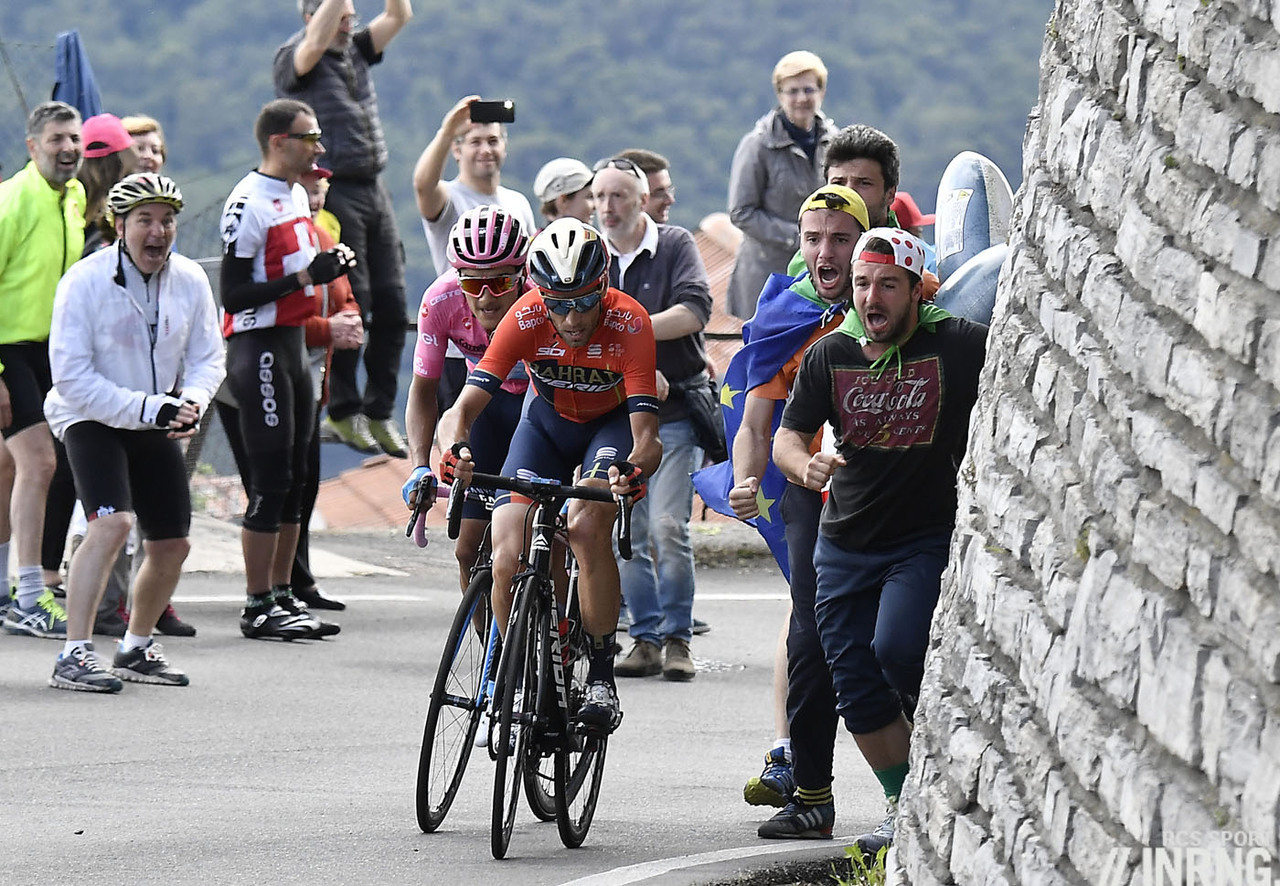
Vincenzo Nibali finishes second. At first glance a second place doesn’t add much to his rich palmarès but it’s not always about victory, it’s his ability to reach parts of Italy that others can’t. He was a protagonist, able to shape the race and also to commune with the Italian public. Cycling remains one of Italy’s great sports but its cyclists rarely cut through to the general public. Nibali does, he can draw fans to the road and sofa alike. He’ll ride the Tour de France but wants a stage win and the mountains jersey rather than going for GC, a more realistic Giro-Tour ambition.
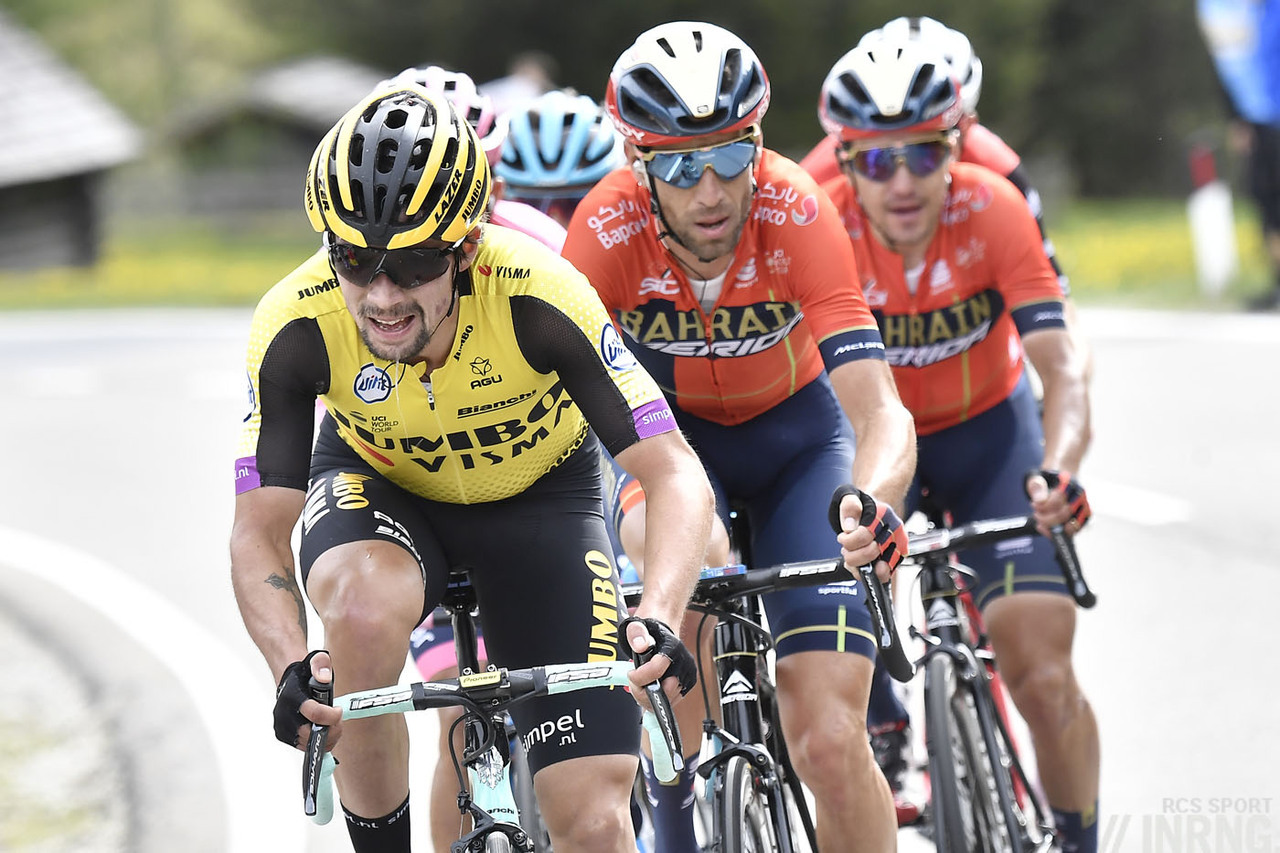
If Roglič was on a stronger team would he have fared better? Yes but the extent is hard to say because his biggest support fell away, first Robert Gesink couldn’t start the race and then Laurens de Plus – eighth in Bologna – got ill. But what difference would a stronger team have made? Roglič lost time to Carapaz on the two climbs of the Nivolet and the Colle San Carlo at points in the race when almost nobody had team mates left. If Roglič needed someone to reel in Carapaz on the climb to Lago Serrù, could Roglič have sustained the pace; if Roglič needed someone to contain Carapaz on the road to Courmayeur who in the world could have done this? Surely a team mate capable of this would be co-leader. Roglič’s third place is a consolidation of his fourth place in the last Tour de France and as rich in lessons learned for him and his team. He was strong in the time trials but didn’t rely solely on them, he was on the attack in the mountains too but for now he remains “the former ski jumper” rather than “the Giro winner”.
This year’s Giro lacked sizzle but it’s hard to pin down why. Was it down to the flat opening phase? Maybe but sometimes the early mountain stages aren’t selective either – Etna 2017 anyone? – , although it did take two weeks to reach the crucial stages this time. Then for all the promise of record vertical gain, the route felt flat in the whole with only two hard summit finishes meaning other mountain stages saw the action happen long before the line, on Stage 16 we knew the result of the Mortirolo long before the GC contenders reached Ponte di Legno. Did Carapaz have an easy ride? He wasn’t extravagant once in the lead but was hardly calculating, a rival only had to stand on the pedals for him to mark them although only Nibali and Roglič were threats.
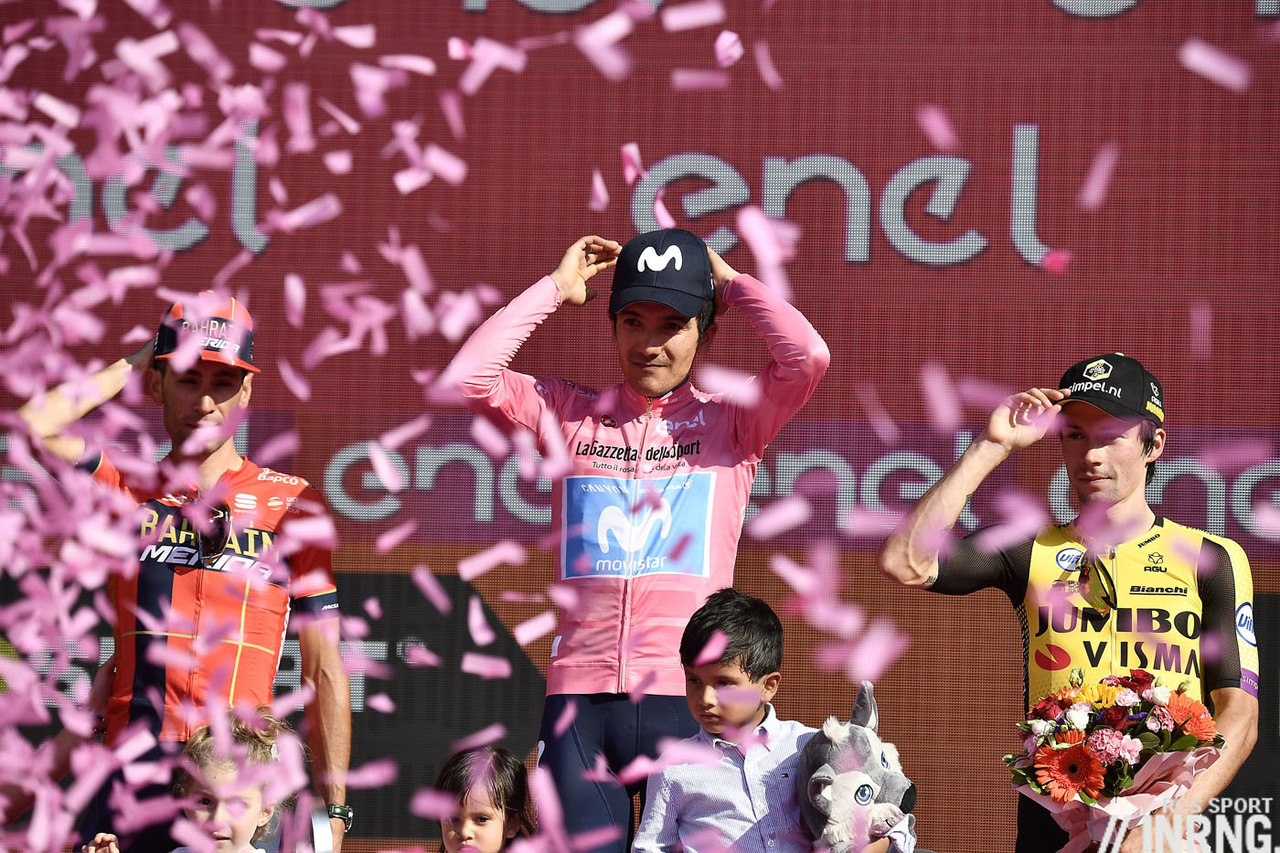
The Verdict
Richard Carapaz is a surprise winner and the deserving victor, he triumphed thanks audacious attacks and dogged defence. He won in Courmayeur when others hesitated and profited from the rivalry between Vincenzo Nibali and Primož Roglič but neither looked capable of beating him in him in the mountains. Once Carapaz was in the lead he was never troubled, helped by a strong Movistar team but equally solid himself, there wasn’t a visible moment where he looked in trouble. Several rivals fell away, figuratively in Lopez and Yates, literally in Dumoulin and the shrinking competition and the plain stages made this an uncharacteristic Giro in the whole.

Carapaz fully deserved the win. For all the talk of Nibali being tactically excellent Carapaz played his hand to perfection, using his under the radar status to slip away and then having the strength to make it stick. Nibali and Roglic let him slip off but it was down to him that he was able to take a minute or more rather than just 20 seconds. I don’t think he’ll be allowed to slip off like that again. I wonder what Ineos’ plans for him are. If they were interested in him before this Giro did they intend to use him in a Nieve/Henao/Landa style mountain domestique, or are they just trying to sign everyone born and raised above 3000m?!
The route was definitely disappointing, on two fronts. Firstly the first 10 or so days were too flat. One of the best bits of the Giro is that nearly any stage can see a GC show down on some technical hilly finish into a town in central/southern Italy. This Giro didn’t really have that. Also I think they have ruined the points jersey. It used to be really good when it was equal points on every stage and you’d get riders as divers as Joaquin Rodriguez and Mark Cavendish separated by 1 point after 3 weeks. Now its only in play on a few days and nearly everyone with any points goes home after 10 days. Ackerman and Demare were miles ahead but neither were dominant, especially Demare, and it was effectively a dead competition in the last week apart from 1 day. I can see why they have done it, to try and get top sprinters in the race, but its not as good as it was. Secondly the mountain stages fizzled out. Half way up the Mortirolo it looked like a potentially classic Giro, but that was the high point of the race. The momentum was taken away by flat stage, 2 easy mountain stages and a pointlessly short TT where nobody was really able to make a difference (the last mountain stage maybe wasn’t easy but the big test was too far from the finish). The last stage TT is good sometimes but if the gaps are too big or there are no TT specialists GC men left then its an anti-climax.
This Giro definitely lacked sizzle, as you say…
I can only put this down to the parcours – the highlight of the Giro for me over the past several years, has been that the route has invited open, aggressive racing across all 21 stages – I don’t mean necessarily on every stage, but the excitement has generally been spread across all 3 weeks, with various stages producing unexpected action and some surprise results – ie the parcours are so open & varied, that numerous teams and types of rider feel like they’re in with a shot of a stage win.
And then even the more formulaic stages have often rewarded skillful & aggressive racing (think of the Sicilian stages last year, for example)…
This year just felt flat. So many of the early stages were so formulaic that nobody really attempted any racing, simply succumbing to the inevitability of a bunch sprint. And the race never seemed to get going after that…even the breakaways seemed to be gifted stages in the final week, as opposed to having to at least fight a little for them!
agree about the first 2 weeks being literally a damp squid, but I think the race was a little unlucky that Yates was off his game for whatever reason, and that TD and Bernal weren’t around. I think Movistar would have had a much harder time controlling things if they’d had to do more than just mark Nibali (didnt seem to have quite his usual snap?) and a fading Roglic.
Full credit to them however, and it looks like Sciandri could be a great hire for them also.
“a damp squid”..is this a fishy comment re. the shark?
Merely to ensure that this is not lost on readers for whom English is not a first language a ‘squib’ is a gunpowder charge for a cannon. Hence if something is a ‘damp squib’ it is something that fails to launch or explode.
haha – yes typos respectfully accepted here in the comments section, not just by our host!
D Evans even made a nice pun out of it…
I can’t quite explain why – and I know I’m most likely alone… but I really loved this Giro…
I enjoyed the ‘it’s all over why continue watching’ section of Roglic taking a huge lead then having it whittled away by poor tactics, a weak team and possibly not having the legs – which of those is more culpable is a debate I (probably alone!) am interested by.
I enjoyed the Bennett/Ackerman build up tiff (and although I realise a German sponsor may have had a big part in this selection, I would also like to know if B-H knew Ackerman might be faster in a sprint…?)
Then once that was done the sprint chaos was actually pretty engrossing, Gavira seems to not be progressing into the sprint king expected, Demare’s beef with Ackerman was entertaining, Ewan getting a victory (I hear many saying he’ll be the fastest sprinter of this gen eventually… why is that?) and finally Viviani’s toils (I like Viv, and it was great seeing his wins last year, but like many I do not think he has the pace of the very best when they get it right so have no issue with him coming up short after a champagne filled ’18, especially in that horrendous ‘specially designed’ Italian jersey…!)
Then Landa/Carapaz coming to the fore has been something I (again probably alone) really savoured, as it seemed to happen so cleverly with Movistar taking advantage of others poor decisions… plus the success of a tactic they’ve been trying again and again with Q/V! Then reading the Ecuador newspapers with google-translate has been heart warming these last few days!! I’m very happy for them and it’s nice when a victory like this transcends sport.
I know that the opening sprints were dull, and we missed a mountain duel, so this is definitely a Grand Tour for the purists maybe, but well… I really enjoyed it.
Above all, I thought Nibali was brilliant in this Giro, adding spice and drama, with his presence alone allowing an unexpected winner to come to the fore. He really shows you how nous and determination count for just as much often in cycling as wattage output. He’s a rider that shows how good those who beat him really are, as they will generally have had to withstand a gale to beat him.
My only real regret on this Giro… however lame it sounds… was being called a xenophobe by LarryT! It’s ridiculous to expect anyone to read a whole comment on a message board of a niche cycling website (and I definitely do not warrant the attention! Even if I think Larry might have revised his opinion had he!) and even stupider for it to stick in your mind – but the thoughts around Nibali’s psychological warfare is something I genuinely find interesting and the INRNG article on Yates’ early press conference was another Giro highlight for me. I likewise think a bit of aggression is probably a good thing as some drama is always fun, and I also do think there is ample proof Nibali goes in for this (Arguing with Wiggo 2012, arguing with Froome after the Tony Martin crash, laying into Roglic and Mcarthy this Giro) – whether some things are lost in translation or amped up by increased media attention on Nibali during the Giro, it’s hard to pretend he doesn’t have this side (whether he feels genuinely aggrieved at the time or not). This doesn’t make him a worse/better cyclist or person for me, in the heat of a race I sometimes might think he comes off as a jerk only to reconsider after the dust settles.
Despite my criticism I also really enjoyed this Giro. Primarily because its the Giro. Its a 3 week race around Italy, even the worst one would be better than nearly everything else. And although the GC battle rather fizzled out in the last few days it was still a good one, unusual in recent times in that it was largely mano a mano and the rider who seemed for most of the race like the strongest was on a very weak team. The Mortirolo climb and descent in the heavy rain created great drama and imagery and was classic Giro in that sense.
It was good but not as good as it could be or has been.
It’s the Giro, so as Richard S says even a bad one is still going to be better than most of the rest.
But there’s no denying that formulaic Tour de France style stages that even the Tour de France is shying away from aren’t the way forward or the way to please Giro lovers.
Great comment, and I also enjoyed exactly the subplots you cited, as well as seeing so many breakaway riders get their days in the sun. Your comment about Bennett and Ackermann is astute, too — despite the fact that Bennett has looked very good this year, and did a great job last year, Ackermann has been a beast in 2019, and I think only his inexperience and willingness to lead out other sprinters, as well as the unfortunate crash, kept him from getting another stage or two.
Firstly, thanks to our generous host for the coverage as usual and always keeping a place of interest and free speech.
To pick up on a couple of notes from above, I enjoyed the points competition as a sub-text to the main event but I have to agree with Richard that the organisers got it wrong in the last week, principally with putting the intermediate sprints way beyond its contestants’ reaches.
With the consequence that the whole thing fizzled out rather, particularly with no sprint on the final day.
And that brings me to Sagan, who’d have probably disappeared up the road in the breakaway to collect the intermediates if the competition was so close. Sagan has talked about the Giro but does it come too quick after the Spring campaign?
Jungels’ condition this time around suggests possibly so?
It would be a coup to get Sagan to Italy but it’s hard to see him sitting out TdF, and Spring / Giro / Tour is not possible.
Sagan could do the Giro and Tour, many sprinters bail out of the Giro and he could follow or he could aim to win the points competition in the Giro and sit out the Tour entirely for once, which might make the green jersey competition in July more open. We’ll see and one thing we don’t see is the appearance fees which RCS is said to pay, for all the talk about riders and teams scanning the routes and profiles, a six figure payment for a star rider and even contractual obligations can be equally important in luring riders to the Giro.
Sagan must be pretty well paid as it is – I think it would need a pretty monstrous cheque from the RCS to make him give up the Spring Classics/California/Tour routine… I would also think his sponsors and Specialized would have a say also…
the counter argument is, I suppose, that assuming he wins his 7th Green Jersey this year (not looking quite a nailed on this year maybe?) then he is the outright all-time leader and might fancy spreading his wings.
I really think he needs to scratch his MSR itch first however, otherwise peaking for that and then again for the Giro looks complicated.
I can’t see Sagan doing the Giro. I don’t think he’d want to after a busy classics campaign and I think whatever RCS offers California/Specialized/the Tour would offer more to ensure he does their races.
think that’s where I sit, agreed it feels difficult to see him switching out the Tour for Giro for all the above, especially with next season needing to be a reset at the classics – I hope in a decade he’s won the amount of classics his talent deserves.
feel like as Sagan seems like such a nice guy, it’s more likely he and Ackerman both go to the Tour sometime as their goals a slightly different and it wouldn’t hugely change the make up of the team, Ackerman would just have to give up any designs of the green jersey and make do that he was sprinting against a team mate. Now I write that… it feels less likely…
I completely agree with those that don’t see Sagan doing the Giro anytime soon. However, I would like to add to the list of reasons why that Sagan is more than a cyclist, he also enjoys somewhat the status of a star and a celebrity in the USA. (I occasionally like to think he’s a bit of the male equivalent of Lindsay Vonn, dominant in one of the sports that doesn´t dominate the USA.) The Tour of California is the best opportunity for Specialized to project this influence on to the giant US sports equipment market, and turn it into income. It is even the best opportunity to project the Tour of California on to the rest of the USA. The impact of bringing the STARS to the tour of California is so big it must be positive even for the brands not directly attached to Sagan (in other words, I am quite sure Cannondale gets more publicity out of the Tour of California if Sagan is in the race than if he´s not and they win everything.)
The Tour of California may be the second most important bike race of the year – this was Team Sky´s point of view when they sent Wiggins there, and that priority was assigned by their sponsors/owners, not the sports directors. So, my point is that, for the money we have the Tour of California, and money is very important for professional sports so it makes sense that some of the big stars go there (and especially Sagan). As much as I would like it to be a better race from the sporting perspective, at least it remains important from the economical side and someone got to do the job. Peter, it´s yours, for the time being.
For the rest of us that don´t really care about sponsor´s incomes and suffer from the combination of love of the sport and italophilia – and just want to watch a good bike race every day (if possible without divorce or losing our jobs) for 3 weeks on end – we have the Giro. I think I would watch even if it was contested by Italian conti teams only, it is such a great race, even if you can´t have the 2018 race and the Finestre every year!
Sagan also seems obliged to do the Tour of California every year, which runs at the same time. Presumably at Specialized’s behest to appeal to the US market.
I think Specialized will be happy with Julian Alaphilippe in their homerace as well
Sure, they are happy, but I think he is far less marketable than Sagan at this point.
I may be imagining this, but I’d swear I’ve read/heard Sagan say that if/after he nails the Tour green jersey record he’d like to do the Giro. I get the impression he doesn’t really love the TdF, but he does love Italy, and is apparently fluent in Italian. He also loves California, but he has a record number of stages in the ToC, and a few stages in the Giro would give him multiple stages in all three GTs, which is a pretty big accomplishment.
It’s also clear that Sagan doesn’t want a long career in road racing, and I suspect if he gets that 7th green jersey this year, he’ll do the Giro next year with Ackermann in the TdF. And as Inrng mentioned, if he doesn’t really care about the Giro points jersey, he could do both.
Thank you again for excellent coverage and analysis.
It was just looking at Grand Tour winner stats. Over history France, Spain, Italy and Belgium are way ahead of all other nations of course, but since Nibali won the Giro in 2016 they have produced no winners. That is nine Grand Tours with no winners from the traditional big four. The previous record was a run of four outsider nations in 87-88 with Roche, Herrera and Hampsten. I know cycling is about much more than Grand Tours, but is this in any way due to the UCI’s intention to internationalise the sport? And is there a danger of leaving core audiences behind?
It’s a long trend, for years the sport belonged to France, Belgium, the Netherlands, Italy, Luxembourg, Switzerland, and Spain with hardly a Brit, German or Dane involved. Now the cast is much wider and so the talent pool deeper. I think the audiences will follow if there’s a home interest, a win probably does help but contenders like Nibali keep the public interested, certainly La Gazzetta Dello Sport reads like Nibali’s diary at times.
Things we liked:-
Androni and ViniFantini having TV points to battle for, plus their breakaway wins. Ok the GC battle may have been slow burn but this side order spiced things up.
The sprint days. Maybe too many but there was a good share out of the honours and the battle of the jersey kept interest going. Remember when the first week was all about Cippolini and then he would have a media appointment at the team car on the first mountain bend? Just spread these days out a bit more, throw in the hilltop towns somewhere and it’s all good.
Those big three-wheeler motos. They went into action on the stupide and kept road space for the race. Just need Ben Hur helmets with red heckles to be a bit more impressionante.
RAI coverage. So I don’t speak italian but I’m learning it thanks to the three week total immersion. When it’s the boring stuff they know how to dial it down and they had three motos with commentators plus five with cameras. They get on the phone to DSs and celeb fans and they never talk about the hotel, last night’s wine… . They super slo-mo when the gruppo di testa hits a pothole or tight turn so the DSs can get in the radio to warn the team. And minimal ad breaks.
Things we didn’t like:-
Lack of depth in many teams. There are just three grand tours in a year and the teams all have enough riders to cover California or Hammer Series plus spares. Soon there will be the usual debate about who is actually leading each team in the TdF but here we had Ineos in particular and several other teams with no Big and no chance. Sunweb and several others fought on and did well despite losses. Yes the TdF is the big thing but a win in il Giro is better than second on the Champs Elysees.
English commentary ( probably ). I’m watching the same pictures as them and I can make the same inferences and errors. Having motos roving through the gruppos and commentators who recognise riders even if they haven’t been IDd by dossard enhances real-time coverage, plus no breaks in at least the final hour is so.much better. Parliamo italiano and let’s get their coverage everywhere.
Stupide roadside exhibitionists should be banned. Yes it can be funny to dress up, with maybe a banner or a mounted stuffed fox but it should be a passive thing and not an act that could be aggressive or inflict something negative on riders. If it goes on getting worse someone is gonna get killed or seriously injured – for a prank. Would viewers support a Taser-cam? s/:
RAI changed the commentary team this year but the coverage was still good. The local coverage is often recommended as you get extra information because they have a motorbike commentator in the race able to add info like who is dropped while the cameras focus on the front of the group, to make their own time gaps etc.
As for the fans, it’s not new. When the 1904 Tour de France returned to the Col de la République a group of locals attacked rivals to “their” local hero with chants of “kill him, kill him” and the reports say the Tour organisers had to fire shots into the air to disperse the mob. In the 1950s Bartali quit the Tour de France after a knife was wielded but people also say this was to slice sausage rather than a rider. There are many other incidents and it’s hard if not impossible to fence off the crowd and to reach everyone beside the road. But as a reminder the road belongs to riders: go and see the race but don’t interfere.
First off; huge thanks for your coverage INRNG.
Reading the comments above and below about the way Jumbo, UAE and Bahrain Merida did or didn’t work to prise the jersey back off Movistar it was also great to see how one breakaway day completely changed the GC top 10 and reset everyone’s ambitions.
We’ve got used to it being inevitable that one rider, one team would get the jersey back and so it’s a case of ‘how are the others going to stop it happening ?’. This was the best Giro for changing fortunes since the Kruiswijk snowdrift.
Was it Rai’s camera moto that was warded off very aggressively by the commissaire’s car for aiding drafting?
To be fair to Ineos, they did have a Big rider in their team (Bernal) until a week before the start.
A first year maybe to be big rider. Bernal has potential, but the Only proven Stars were Nibali and Dumoulin in my view.
oh yes second year of course
Well, to be fair, it’s probably the first time they sent a team you can actually like. Come the tour, they will bring on the rest and stifle any interest out of the race, of course.
Don’t know whether it’s new, or even if just RAI do it, but I really noticed and enjoyed the ‘fan’s eye-view’ shots where the camera bike stops ahead of the main group and lets them approach and ride past with a tracking shot. A subtle but welcome change to the normal shots from directly in front/behind
Thanks INRNG for your unmissable posts – they really do add to the enjoyment of each day’s racing
love your take here plurien.
the depth of teams I think is why the parcours fell flat, I don’t blame vegni. two seemingly under-prepared teams (UAE, Jumbo) traded ownership of the maglia rosa for a while, and it led to an absolute mess of race craft and the GC battle was tepid as a result. You had two strong teams left after the shakeout, in Astana and Movistar – clearly heads and shoulders above everyone – but I’m not 100% sure what Astana was doing, or if it was just a symptom of what happens when your GC leader (Lopez) isn’t putting it together as GC leader. Movistar I don’t think necessarily had as great tactics as people are claiming (in hindsight). Their leader had legs, which is the deciding variable for any strategy, but I don’t feel they took responsibility for their position of strength in the peloton which I didn’t appreciate (they are maybe too used to leaning on Skyneos), but exploiting gaps is of course one of the ways to win a GT and that’s fair enough. My point being: Movistar with the superior team did not do the work of winning the GT; if it wasn’t for Nibali, Roglic would have likely won the Giro. Say what you will about Nibali but he always has his team do their part befitting of a contender, which is why I like him. 100% not trying to take shine away from Carapaz though, I called him out in the leaders preview post as my pick for Movistar’s win and he has such positive energy I enjoy seeing him celebrate.
It’s nice to see a climber win, and who would’ve thought looking at the parcours we’d finally have our mythical ‘climber gt winner’ that everyone is always asking for 🙂
I think Movistar, or its riders played the Giro perfectly. From the very start there was no urgency in gaining the jersey until the mountains. Why burden yourself unnecessarily. Jumbo were desperate to get rid in comparison.
All eyes were on Roglic and Nibali, and so when Carapaz started to claw back time few gave him much credence as a real GC threat. The expectation was that Landa would be the one to carry the GC challenge. So when Carapaz stole his moment, Nibali and Roglic were to busy squaring up to each other.
Once they secured Pink neither Roglic nor Nibali had a team which were effective enough to help threaten Carapaz. Landa’s position in fourth also made the situation more complicated with both riders having to look over their shoulder, and one eye up the road. Nibali is an amazing tactician on the bike but Carapaz/Movistar had him in checkmate once they got the Maglia Rosa. No one else could challenge them. A win by stealth if there ever was one.
A very impressive ride by Carapaz. However my heart sinks with the news he is off to Ineos next year. How they fit him in I am not sure. But likely going from grand tour winner to mountain domestique is the likely scenario.
It is really not good for the sport to have so many leaders on one team. Froome, Thomas, Bernal, Carapaz, Sivakov, TGH, Kwiatkowski….etc. Financial doping is more damaging to the sport than anything else. Imagine if each of these riders was in a separate team. A great shame.
The plan for Ineos, I think this was aired by journalist Jeremy Whittle on a podcast, seems to be to win all three grand tours in the same season and the most risk-free way to do this is to have two contenders in the team for each race, this need not mean six grand tour contenders as the Giro and Vuelta can double up but nearly to cover for illness and injury. But Carapaz’s deal could have been developed last year before he was the proven grand tour winner he is today. Still it does look like someone is playing Velogames fantasy cycling with 200 credit points while everyone else is on 100 but in sport sometimes surprises still happen.
I was hoping in the near future you might do a climbing vs TT winning overview for Grand Tours.
In the last few years, the only Grand Tour winners that lose buckets against the clock is Quintana and Aru?
Risk-free seems to be the ideal of team ineos, why else would they overspend so much. Thats maybe why theyre not so much into one-day-racing, too much can go wrong, they leave this to quickstep
Point of order: surely it’s only financial doping if it’s against the rules?
And out of those riders you mention, only one is a proven, consistent GT competitor. Bernal, Sivakov, TGH look like they’ll be good but there’s no guarantee, Carapaz and Thomas have ‘only’ won one GT each and Kwiatowski is a long shot. The young guys are a succession plan for post-Froome which you’d expect any decent organisation to try and put in place.
All that being said, I do think that we’ve reached a tipping point where the TDF in particular could (has?) become a non-race, which is damaging for the sport as a whole. I used to think that it’s up to other teams to match Sky in terms of raising money, rather than drag Sky down for being successful, but the Ineos incarnation looks ominous with regard to budget, and economics mean that it’s impossible for the other teams to raise the money needed to match. What the answer is I don’t know – salary caps are easily circumvented, a team like Ineos would take the luxury tax as a minor inconvenience, restricting team numbers affects everyone. It’s not an easy problem to solve.
Fantastic write up.
Thank you.
So many questions – for some reason primary among them is, if you were a DS would you ever willingly relinquish a Leaders jersey in a Grand Tour. I may be wrong, but it seems to have bitten a few times since I’ve been following cycling, and whilst Roglic may not have followed on the mountains, I can’t get it our of my head that it sends the wrong message to a team and has negative psychological impact.
I think most teams like to loose the jersey if they can to a non gc competitor if they have it to early, except those teams who know they won’t win – they will defend it to the death. I seem to recall even lances postal would. Its just better not to pull every day.
The issue with having the jersey is all the associated media and sponsor post stage hoopla. Endless interviews and photo opportunities. This distracts from the now well established post race practices of, warm downs, ice baths etc. It also takes up energy which is something that must be carefully conserved until the end of the race. An “ideal” scenario would be for a rider from a team (or combination of teams) who are not in the running for the GC to have the jersey until say the second weekend. Good for the other teams and less stress for those chasing overall victory. Experience plays a role too, the Sky folk seemed to have all this worked out. I seem to remember they had the yellow jersey for most of the 2017 Tour.
At this Giro I got the impression that Jumbo Visma found the whole thing a bit much, certainly they made a mistake in “giving away” the jersey on the road to Courmayeur, something DS admitted post stage.
Yeah… know post-race stuff gets hectic etc, and a good point on Postal… I just likewise remember Sky’17 and have this feeling that in modern cycling it is possible to keep the jersey from the start and for a team it’s better to just keep things simple and race with the same mentality at the start as if it’s the end, rather than get into the confusion of playing clever as it seems more often than not this doesn’t work.
I have a thought recently that fast = fast, and this may be very daft as my small experience can’t translate the larger canvas of a WTteam – but when I cycle quick for an entire ride rather than conserving to go fast on a hill, I end up going quicker on the hill anyway… and I just wonder if in this particular case, it would be better as for a team to keep it simple and just race hard to keep the jersey taking each day at a time, and look to raise their standards to what might seem difficult until you try it, rather than getting into the clever clogs mode of thinking ‘today we’ll go easy’ and starting to think counter-intuitively of when you should race and when you shouldn’t in the middle of a race – basically because to me that feels like a negative mindset which should be avoided at all costs.
But… Yates had to get clever and know when to conserve to win the Vuelta and learn from the Giro, so there are many arguments against this… for me that is just slightly different because it’s one person racing within themselves and choosing when to drop the hammer rather than giving the initiative away as losing a jersey might do.
i dunno. maybe daft!
Given the huge expenditure of energy required just to finish riding a 3 week race let alone win the thing the riders conserve every scrap of energy they can. For instance the riders are well known for minimising any walking during the race, sometimes almost to silly extremes. On rest days most of the time is spent asleep. It is a myth that you can “ride into form” in the third week. All the riders reach peak fitness at or near the start of the race but some manage the inevitable decline better than others or spread their effort to when it is needed most. Racing 3500kms around the roads of Italy (or France or Spain) takes an inevitable toll on the rider’s bodies, almost every calorie counts.
Totally agree and totally see this – I guess I’m just saying that maybe there’s something more intangible here, that you can get obsessed with calorie counting and maybe lose sight of the importance of mindset as it can’t be calculated in the same way – not being a psychologist I have absolutely nothing to back this up with, and it’s likely an each to their own territory where it’s different for every rider/team… but for me at least there is a scenario where it can have a more detrimental affect on a team’s mindset than just racing on and not over thinking things. Simply because one is looking at the positive and one is the negative. But this may just be how my mind works.
After having had a pretty low opinion of Movistar in recent GTs this time they were well nigh perfect. They rode as a team and once they had the lead there was little chance of them loosing it. Did Max Sciandri really make the difference? You did wonder if Mikel Landa thought he was still wearing a Sky jersey, he was the strongest rider come the third week but the chances of him winning a GT, riding for whatever team, are slim whilst he continues to ship so much time in TTs.
For all the talk I wonder if Vincenzo Nibali really had the legs to actually win. Yes he was only a minute or so down at the end but I had the feeling that Richard Carapaz / Movistar had something left in reserve and could have ridden harder in the last couple of stages if it were needed.
I agree that in the end the course was somewhat disappointing. Does it work better when the mountains are traversed east to west rather than west to east as in this edition. Having the Agnello / Finestre / Nivolet etc as the big mountain showdown maybe works better than the climbs in the Dolomites or eastern Italian alps. Having said that it is the riders that make the race and if Tom Dumoulin had been 30 seconds behind Richard Carapaz going into the last mountain day then we might have a rather different view of the whole thing.
I was surprised Pavel Sivakov lasted until the end, clearly some long term potential there.
As always Inrng provides the most knowledgeable and best written cycling analysis around. The Tour countdown starts on Sunday with the Dauphine sure that will provide the basis for lots insightful prose.
Perhaps we’ve been spoiled with many great Giros in recent years but this is unlikely to be remembered as a vintage edition. Tactically very impressive riding by Movistar in a radical departure for that team, although they were by far the strongest team in the race, and when Sky/Ineos play that role fans aren’t so thrilled. Agree with everyone else about the very dull first couple of weeks, and one can’t help but wonder how Dumoulin’s ongoing presence would have changed the dynamics of the race.
And while I know INRNG is being poetic, it’s not so much “altitude sickness” that has most of the sprinters going home early but rather team orders. Being fresh enough to win even one stage of the Tour de France is probably considered more valuable by non-Italian sponsors than taking home the points competition at the Giro.
Anyway, thanks as ever for the coverage and for all the folks contributing to the conversation.
I thought that with the parcours and how the race turned out, the organisers were doing a grand job of offering the Giro as a 2 week race…….!!!!
Heaven forbid that, but it would be hard to argue against it based, solely on this year.
Great recap of the race. I know every pundit has been saying this year’s Giro was a bit rubbish but I found it really entertaining, it had quite a few moments which had me shouting at the TV. The unpredictability of the results, especially in comparison to le Tour was as great as ever. The success rate of the breakaways, the stellar lineup of GC contenders, Simon yates failing to live up to his Muhammed Ali style trash talk. The motirolo stage. The final sprint stage with the breakaway barely winning. Nibali in form. Ineos/SKY not winning anything. THAT poorly timed toilet break and the ensuing in car video. superman assaulting someone else. And the media coverage on Eurosport, particularly with Bradley Wiggins punditry was great.
Thank you to Inrng and all the (mostly) erudite commenters for susbstantially improving my understanding of the race as it developed.
My viewing was limited to the hour Eurosport highlight show on Quest in the UK, which I found irritating to the extreme, too much talk, not enough racing. It sounds like the panel discussion with Wiggins, Blythe et al worked well on Eurosport but on the Quest show is seemed mostly distilled down to inanity. The slo-mo analysis of Ciccone’s expression as he crossed the finishing line and therefore”how much it meant to him” was an excruciating waste of time in such a short show.
Not a Giro for the ages but as Richard S correctly noted above it’s pretty hard not to like three weeks of bike racing round Italy.
Excellent summary and excellent daily previews. As ever. Thank you.
Love the image of Cima and Denz +1 on a super breakaway stage. Loved it first time round too!
Agreed – great choice of an image, The +1 is breakaway fanatic Mirco Maestri who specialises in intermediate sprint competitions to such an extent that he won the Points jersey at Tirreno-Adriatico despite never finishing in the top 100 on any stage.
Carapaz’s punchy stage win helped turn around the time loss in stage 3 more than anything else – think he punctured late then got caught behind the subsequent late late crash just as he was getting back on, losing 45 seconds. His TTing was really solid in the first two that mattered – 14th then 11th.
He was also savvy enough to not let the question of team leadership ever come back to the fore once he had the lead over Landa too – think it was stage 13 where Landa had gone up the road and they would’ve been very close on GC…if he hadn’t attacked and got a gap thereafter finishing just a few seconds behind and maintaining the lead on his team mate.
The poorly timed mechanical was as close as he got to a moment of weakness in the whole 3 weeks.
Also thanks for the usual informative daily previews, the first thing I’d read every morning for 3 weeks. I’ll miss the routine… until July hopefully.
Pretty much agree with your summary Mr. Inrng, thanks for the entertaining work!
RCS and RAI created a forgettable Giro d’Italia this year in many, many ways, but I’ll save that rant for another time.
What I will celebrate is the jersey winners – Carapaz came from seemingly nowhere to a deserving win (though I’m still wondering why so few Visentini/Roche or LeMond/Hinault comparisons were made) while who can’t like Ackerman both on and off the bike? Ciccone being unleashed from wasting effort so “always there, never a threat” Mollema could drone on to 5th was great and Lopez overcoming mechanicals, idiots and more to capture the white jersey was a highlight.
Finally to oldDave: What else do you call people who play on offensive stereotypes of Italians as cheats, hotheads, womanizers, etc?
“XENOPHOBE: dislike of or prejudice against people from other countries”
Cool.
I can see I won’t make it through. You’ve beaten me.
I at no point said or implied anything to be a stereotype or called anyone a cheat or womanizer. I realise this is a bonkers chat room chat that that will bore anyone who looks. I apologise if you took the comment the wrong way, and as a fellow cycling fan hope you enjoyed the Giro. I’ve said repeatedly I like Nibali, and that has no real bearing on me also thinking he tries to get under rivals skin, as do other sportsmen and women from every country on the globe, nothing to do with his or their nationality. But I think you probably know that I have nothing against him or Italians and are smiling that I’ve even taken the time to respond. I’m a fool clearly.
Time to close the book before we bring down the standard of this comment board further.
Wait, this ‘xenophobia’ is about oDave pointing out the obvious fact Nibali likes to play mind games with his opponents in the press, and either feigns or actually gets upset at them as a way to pressure them?
How is that a stereotype or controversial?? it’s one of the things I love about Nibali!
I guess it comes down to how much any of what you claim is FACT rather than just your opinion. I guess it’s not xenophobia but just some odd situation when Italians are described as those who “tries to get under rivals skin” based on nothing more than opinion and/or stereotype?
Reminds me of BigMig who always came across (to non-Spanish speakers) as a quiet kind of stoic competitor whose interviews were usually translated in a way that made you believe it…until I spoke with a native Spanish speaker who pointed out the TV translator was not literally translating what BigMig said, but some PR kind of blather designed to make him look good.
I suspect Nibali gets the reverse treatment, which affects Anglo-Saxon opinions, so maybe it’s not xenophobia but simply bias created by the translator or author of the reports?
This is all in your head. It’s not in oldDave’s head and it’s not in anybody else’s head. You are generalising about Italians and Spanish and Anglo-Saxons and their bias, nobody else is doing that. So who’s the xenophobe here? Who is the racist?
This is amazing – oldDAVE actually made an effort to point out that things might get lost in translation when he first wrote… now repeating him? I’m fascinated Larry – do you reply without reading full comments or are you actively trying to argue? This is the most bizarre debate… I can only believe it’s the later as you’ve seem to have midread the comment so obviously.And while we’re talking about translations… I’m not sure Nibali’s reaction that caused Froome to storm onto the Astana bus needed much translation, nor the words directed at McCathy the other day… why are you so adamant Nibali is a saint!? I also like his use of mind games every so often… what’s the big deal…?
I really hope you’re just winding us up.
Jordan H wrote: “Nibali’s reaction that caused Froome to storm onto the Astana bus ” pretty much serves as an example of what I’m pointing out as xenophobia, no? Whatever the evil/crafty/hotheaded/cheating Italian did “caused” the amazingly normal and level-headed Froome to storm into the Astana bus. Reminds me of the husbands who beat their wives while asking “Why do you keep making me do this?”
I’ll leave it at that, pointing these things out just tends to crank up the outrage from those accused as it did with plenty of US folks during the BigTex days. With Americans perhaps it was less subtle – remember “Kick their ass, eat their cheese!”?
I think you’ve lost everyone here Larry. Being a hot head or using the media to provoke your opponents, or just outright provoking your opponents to their face without bothering to go through the media, has nothing to do with your nationality and accusing Nibali of doing it is not xenophobia. Off the top of my head I can think of a Scottish football manager, a Portuguese football manager, an Irish footballer, entire Australian cricket teams and of course an American cyclist that were very good at all of those things. You are too easily offended at any slight, genuine or perceived, against Nibali in particular and Italy in general.
the weirdest thing is that Larry has a link to his cycling holidays website on his profile here (you can click above to go there ^) and he’s posting on a site which surely has a lot of potential business for him… so you’d think he’d be a little reserved in his responses… yet anyone who reads these comments would surely think twice about venturing out into beautiful Italia with this crazy cat! 100% Richard: ” You are too easily offended at any slight, genuine or perceived, against Nibali in particular and Italy in general.” There was no insult or offensive comment made in any of the above.
I was thinking of the bullying and mind games that LA did in his time as this silly tempest in a teapot has raged about Nibali. Frankly, LA was/is an extreme outlier among US sports figures, and there is nothing “American” about being arrogant, belligerent, dishonest, and actively trying to undermine opponents and even teammates. At the time he was at his zenith, I was struck by the way the serious cyclists I knew, some of whom had ridden in races with him during his triathlon days, despised him. And yet, if you look at the comments sections of certain cycling sites (not here!) you’ll see that it’s common to tag LA as a “typical of the American attitude.” If you look back through sports history, you see narcissistic (I’m using the word clinically here, not in the silly sense of people who just want some attention) and borderline sociopathic athletes come from everywhere. In the US, for every Ty Cobb and Barry Bonds there are several Willie May and Ernie Banks figures, if you know your baseball.
As a counter example to the supposed Italian xenophobia, and sticking with cycling, the list of inspiring and beloved Italian cyclists and cycling figures is long. If there is a cultural/national filter to which many non-Italians look at Italian cycling, it emphasizes passion and style and determination. I don’t think pointing out that Nibali is fairly adept at using his stature to play some games with his opponents is in any way a slight on a nation or a people.
@KevinK : the victor always gets to write the largest share of the narrative. Certainly winners gain column inches, so the fact of the matter is that a disproportionate amount of media focused on Armstrong and as a byproduct ends also disproportionately representing what an American is. It’s the same with Hollywood and porn. Poor sods from back-water countries think Americans use vulgar language and that Western women drop their pants at the merest sign of an erection. The media has a lot to answer for.
As they say, be careful who your heroes are: fortunately neither Michael Jackson or Lance were amongst mine.
My highlight of the Giro were the never tired Androni boys. Nearly no break without at least one of them involved. 9th in team classification ahead of many WT teams. Well deserved wildcard.
And speaking of wildcards: can we agree that Israel Cycling shouldn’t get another, or is this part of an ongoing organizers contract with the Bibi regime for the farce last year?
RCS will probably try to include a Hungarian team instead next year 🙁
Good news – none are eligible.
It doesn’t appear to be a consistent policy though. The year they had the stages in the Netherlands did not have any additional wildcard teams from the Netherlands.
I think the bid for getting a GT to the Netherlands is mostly on a regional basis (cities, regions, provinces) and not so much on a national basis or associated with national government. Therefore, there’s probably no contract or agreement to invite a team like Roompot. Also keep in mind that the Netherlands has one/two WT teams (Sunweb isn’t Dutch but it also kind of is) and actually hosted the most foreign GT starts of all countries.
Oh my….didn’t know they start in Hungary next year. Good for Victor’s regime.
I smell a pattern.
First of all: Thank you, INRNG, for your great analysis of the stages and the races. Your daily stage-winner picks were and are great to read, especially since you often point out things that I already forgot or – initially – don’t find as relevant.
Unfortunately I don’t understand any Italian, hence I had to stick with the Eurosport-coverage. And maybe it’s because I’m used to it (German native speaker here) but I found the German commentary to be a lot better than the British one – especially the insights of Jean-Claude Leclerc are top notch imo.
Thank you to whoever posted all these italo-house classics. You made me discover a new genre of music. I really enjoyed reading that the Giro would pass this or that city which has this “famous” DJ who made this track. It added more variety to a comments section which I do read often but very rarely never comment in.
This basically leads me to my last thank you – thank you to all you people who commented and added a lot of insights to a race that always amazes me – no matter how boring some stages might be. Very enjoyable!
I always enjoy watching a 3 week bike race, whatever: it’s an incredible event. The riders always give so much. A slow burner like this year’s Giro will make other more dynamic races feel more special.
And thanks to inrng. The best place to learn, reflect and share on road race cycling.
Not a vintage edition, but it is always exciting to watch Italians racing in Italy. Nibali is always a fascinating character, and he had some strong support from Pozzovivo and Caruso, and Masnada and Ciccone were a joy to watch.
I’m looking forward to seeing Nibali on a lovely red Trek Emonda.
My next bike, methinks.
Happy days.
Wish he was on a colnago, wiiier, bianchi etc
Or a Pinarello
Without the contenders Bernal and Dumoulin added to the mix in the final mountain stages, the cake was missing some key ingredients. And the long flat stages stacked up front made for a boring start where the Giro could be lost, but never won. As Forrest Gump said, Grand Tour racing is like a box of chocolates, you never know what you’re gonna get.